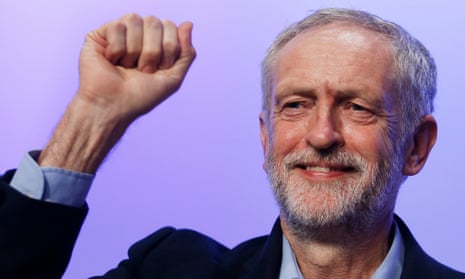Do you resign yourself to public opinion as it is now, or do you attempt to change it? That is a question that has long divided Britain’s left and produced two competing strategies. The “centrist” approach is one that amounts to resignation. Voters are where they are, and it is largely futile to campaign to change minds when Labour is in opposition. It will simply render the party out of touch. A longstanding centrist argument was that the public believes austerity is unfortunate but necessary, and so economic credibility is defined by signing up to spending cuts. Labour’s left, on the other hand, refutes this pessimism. Public opinion can change – and dramatically so – if the counter-arguments to rightwing orthodoxy are heard loudly and forcefully.
The annual British Social Attitudes survey is a source of vindication for the left’s strategy. One of the greatest hindrances to its political advancement has been a negative attitude to benefit claimants. A widespread view that benefit claimants are “scroungers” wounds the left for a number of reasons. It redirects anger away from the powerful to those at the bottom of society. It undermines faith in state intervention. It chips away at support for social security. It fuels opposition to public spending and for raising taxes to pay for it: your money is being wasted on the undeserving, the Tories would have you believe. So a dramatic shift in attitudes to benefit claimants is very good news indeed. While 35% of Britons agreed dole claimants were “fiddling” in 2014, the level fell last year to 22% – the lowest for three decades.
Attitudes to public spending are being transformed, too. Fewer than three in 10 Britons now support slashing spending to help the economy: in 1996, it was 43%. Nearly half the population advocate increasing taxes and spending more – 14 percentage points higher than 2012. It is Labour’s case for investment, rather than cuts, that is winning the battle for public opinion.
Imagine, in 2015, Jeremy Corbyn had not become Labour leader. It was just months after Labour MPs had infamously been whipped to abstain on the welfare bill, a decision justified on the basis that the party could no longer defy public opinion. Another leader might have undertaken passionate tirades against benefit claimants who were playing the system. It is entirely plausible that Labour would have achieved nothing except to help exaggerate the problem of benefit fraud in the minds of the electorate, in defiance of where public opinion was ultimately heading.
Instead, Labour now has a leadership that has enthusiastically made the case for public investment. It has encouraged people to punch up, not down: it has said that tax avoiders, reckless bankers and poverty-paying employers, not benefit claimants and immigrants, are more deserving of Britain’s anger. For the whole of the last parliament, George Osborne – whose public grudge against Theresa May is not enough to rehabilitate him – led attempts to trash Labour by vilifying benefit claimants. But social security is no longer at the centre of political debate: Labour has shifted discussion to the behaviour of powerful vested interests championed by the Tories. Years of campaigning by activists, as well as people’s lived experience – the longest squeeze in wages since the 19th century – have undoubtedly changed attitudes, too. But Labour’s refusal to support cuts or demonise benefit claimants was bold – and is changing minds.
What’s so striking about these figures is that the research was conducted many months before the general election. It was this election, after all, that granted Labour a public and relatively unmediated platform to set out its vision, leading to an almost unprecedented turnaround in support. The party’s call for the top 5% to pay more tax to allow proper investment in public services resonated with millions. In contrast, Theresa May’s insulting response to a nurse who had suffered years of real-term pay cuts – that there was no magic money tree – helped seal her fate.
Just as public attitudes shifted against collectivism and statism in the late 1970s, the Tories themselves sense the winds are changing. We are, potentially at least, in a moment of transition from one era to another. A resurgent and emboldened Labour party has tabled an amendment to the Queen’s speech calling for an end to the public sector pay freeze. Discipline is breaking down in a deeply shaken Conservative party, and prominent Tories such as Oliver Letwin and Michael Fallon have both suggested the freeze could end. “We know people are weary” of years of cuts, a humbled No 10 declared. But the Tories should not bank on being saved by surrendering to Labour’s arguments. They are merely validating positions better embodied by their opponents.
None of this should breed complacency on Labour’s part. The party should not simply assume that an inevitable shifting is under way. But the British Social Attitudes survey shows the left was right to be bold and firm in its arguments. Now that Labour has a renewed confidence, a unity that was previously missing, and Corbyn has emerged a greatly strengthened figure, the party’s potential impact on public opinion is even greater. Voters are being exposed to arguments that have not been aired in the mainstream for decades. Prophetically – on the eve of Corbyn’s first leadership triumph – one Telegraph commentator warned that Tories should not congratulate his victory, because it “would become acceptable again to call for nationalising vast swaths of industry, for massively hiking tax and for demonising business. The centre-ground would move inexorably towards a more statist position.”
This is the Overton window – which defines the range of ideas and policies that are palatable at any given moment – at work. Its movement allows us to change the narrative from cuts and bashing people at the bottom of society to investment and challenging vested interests at the top. In 2015, Labour’s members were offered a choice. One was pessimism: you might not like where the public is but tough, you’re going to have to accept it. The other was optimism: that while the public did agree with the left on, say, public ownership and hiking tax on the rich, they could be persuaded on public investment and social security. Optimism has triumphed. Like Margaret Thatcher in 1979, Corbyn’s Labour is both the beneficiary and cause of a changing public mood. And that’s the prize: not just electoral victory, but the building of a new political settlement that would long outlast a Corbyn premiership.

